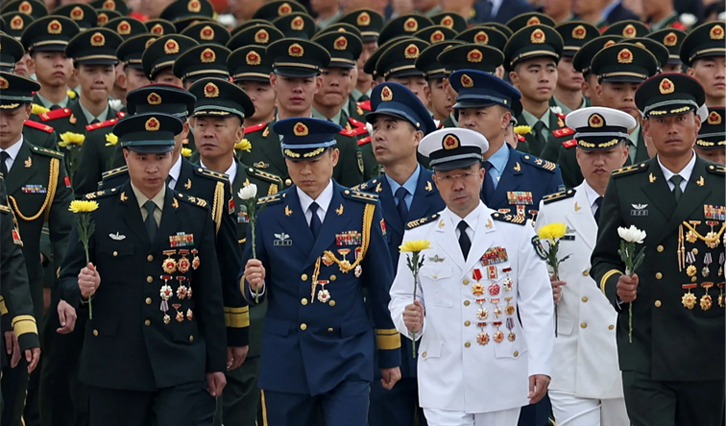Is China’s military ready for war?
M. Taylor Fravel, director of the Security Studies Program (SSP), analyzes China's military capability and preparedness for potential conflict.
M. Taylor Fravel, director of the Security Studies Program (SSP), analyzes China's military capability and preparedness for potential conflict.

A ceremony to commemorate Martyrs’ Day in Beijing, September 2024
A new wave of purges has engulfed the senior leadership of China’s military, the People’s Liberation Army. Since the 20th National Party Congress in October 2022, more than 20 senior PLA officers from all four services—the army, navy, air force, and rocket force—have disappeared from public view or been removed from their posts. The absences of other generals have also been reported, which could foreshadow additional purges.
Most notably, since the fall of 2023, three of the six uniformed members of the party’s Central Military Commission, the top body of the Chinese Communist Party charged with overseeing the armed forces, have been removed from their posts. The first to fall was Defense Minister Li Shangfu, who was removed in October 2023 and expelled from the CCP in June 2024. Then, this past November, Miao Hua, the director of the CMC’s Political Work Department, which manages personnel and party affairs, was suspended for “serious violations of discipline” before being formally removed from the CMC last month. And most recently, the Financial Times reported that He Weidong, the second-ranked vice chair who has not appeared in public since early March, had been purged.
Never before has half the CMC been dismissed in such a short period. Even stranger is the fact that all three generals had previously been promoted by Chinese leader Xi Jinping; they were appointed to the CMC itself in 2022, after Xi consolidated his control over the party at the 20th Party Congress. He Weidong was even a member of the Politburo, one of the party’s top decision-making bodies, comprised of the 24 highest-ranking party leaders. And Miao and He have been described by analysts as being part of a “Fujian faction” within the PLA, because the generals had been stationed in that province at the same time as Xi and are believed to have close ties with him.
The fact that these high-profile purges are occurring now is not lost on outside observers. In 2027, the PLA will celebrate the 100th anniversary of its founding. It is also the year by which Xi expects China’s armed forces to have made significant strides in their modernization. Finally, the year is noteworthy because, according to former CIA Director Bill Burns, Xi has instructed the PLA to be “ready by 2027 to conduct a successful invasion” of Taiwan. Xi’s instructions do not indicate that China will in fact invade Taiwan that year, but, as Burns put it, they serve as “a reminder of the seriousness of his focus and his ambition.”
With such ambitious goals set for the PLA, the question then arises as to how this new wave of purges could affect the PLA’s readiness. The purges themselves are likely to slow some weapons modernization programs, disrupt command structures and decision-making, and weaken morale—all of which would degrade the PLA’s ability to fight in the near to medium term. Beijing may now be forced to exercise greater caution before pursuing large-scale military operations, such as an amphibious assault on Taiwan, even as the PLA continues to pressure Taiwan with aerial activity and naval patrols around the island.
Nevertheless, it is useful to remember that Beijing has rarely waited for the right conditions before ordering the PLA into battle. In 1950, for instance, Chinese forces intervened in support of Pyongyang in the Korean War, even though China’s economy and society had been devastated by years of civil war. In 1962, the PLA attacked India, even though China’s most senior military officer had recently been purged for questioning Mao Zedong’s disastrous Great Leap Forward. And in 1979, Beijing dispatched an ill-prepared PLA to Vietnam, where Chinese troops suffered significant losses for limited political gains. Now, as then, Chinese leaders may pursue war even if the domestic economic and political conditions appear unfavorable—and even if the PLA is not ready to fight.